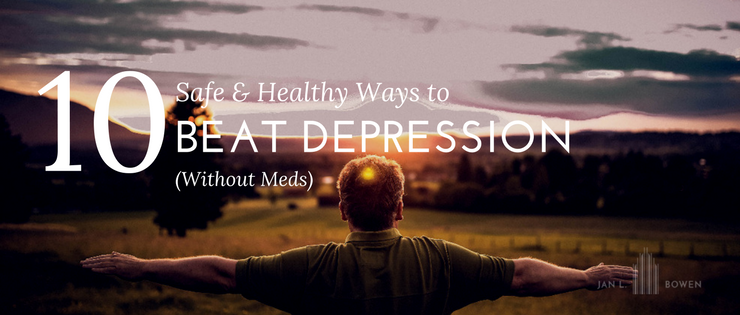The world is struggling with depression. In fact, depression is now the world’s leading cause of disablement, and the leading cause of suicide.
An estimated 350 million people globally officially suffer from depression, with many others still undiagnosed. Physicians, wanting to help their patients, often prescribe antidepressants in an attempt to correct chemical imbalances in brain functioning. But mounting research reveals that anti-depressants and other medications prescribed just aren’t that effective. The NIMH concludes that antidepressant use is a complicated issue, and there’s no consensus among users or physicians that the class of drugs are universally successful.
Why is the use of medication for depression so complex?
Because the brain registers stimuli in a “pain matrix” but it doesn’t always distinguish where and how the pain is experienced. It also doesn’t always distinguish between emotional and physical pain. Many medications are designed to read specific neurotransmitters within precise regions of the brain, yet with no definitive result of where depression is experienced cranially.
It’s no wonder pharmaceuticals don’t always work. But there’s no need to continue suffering.
Instead, why not build your own toolkit of alternative remedies?
The goal of prescribed medications is to stimulate various neurotransmitters and brain chemicals, and to bring the emotional and physical body back into balance. Alternative therapies share the same objective.
It can seem simpler to just take a pill, but alternative approaches often bring about powerful relief from depression symptoms while also yielding other desired changes. They can be subtle and take a little longer to see the results, so if you feel inspired, keeping a journal of your progress is a good idea.
Try the following approaches as independent solutions, or in combinations.
1. Think of ‘food’ as medicine.
Even though we are each biochemically unique, there are universal choices that are healing for depression. What you eat can transform you, just as how you eat also nourishes you. So take time to consciously appreciate the healing nutrition of the food and the powerful actions you are taking in making yourself well.
Here are some foods and vitamins known to help relieve depression:
- Healthy fats: Fish, walnuts, flaxseed, dark leafy vegetables, coconut oil and avocados are all rich in omega 3 fatty acids, which work to build brain boosting hormones and DHA to improve both mood and cognitive functioning.
- Vitamin D: Vitamin D is instrumental in regulating mood. You can find it in fish, milk, eggs, and mushrooms, in addition to sunlight.
- Nutritious carbohydrates: Make your carbohydrates count by eating whole fruits and vegetables, and whole grains which all provide fiber, vitamins and minerals. In addition to nourishing your body, you will be building the neurotransmitter serotonin.
- B vitamins for stress: Research shows that B6 and B12 vitamins are helpful in fighting depression, as they boost production of neurotransmitters, particularly serotonin and improve cognitive functioning. Foods rich in these vitamins include fish, poultry, eggs, bananas, green beans, legumes, and green peppers.
- Dark and raw chocolate: Chocolate, particularly dark and raw chocolate or cacao, is a potent source for serotonin-building in a tasty way.
- Green tea: In addition to being a rich source of antioxidants, green tea contains the amino acid theanine which has been found to fight depression by promoting the production of neurotransmitters, including GABA and serotonin.
- Magnesium: Magnesium is a critical nutrient, yet many of us are deficient. One symptom of deficiency is anxiety and depression. Include seafood, mineral water, almonds, peas, broccoli, oatmeal, flaxseed, bananas, or cashew nuts to boost your levels.
Food as therapy also includes avoiding what doesn’t benefit you. Excess caffeine can be detrimental, as it amplifies anxiety, which often accompanies depression. Sugar is responsible for instability of blood sugar, resulting in mood swings — again, not a favorable condition in tandem with depression. Alcohol can have a temporary positive impact, but is actually a depressant. If you don’t avoid these foods entirely, do monitor how you use them and observe your response to them.
2. Get your body moving.
How you exercise doesn’t matter, just move your body daily. Exercise is one of the single most effective ways to naturally overcome depression. Getting started can be the hardest part, so bribe yourself to do it.
Exercise regulates your brain chemicals and boosts your neurotransmitters, including serotonin, norepinephrine, and the endorphins naturally. Try yoga, a daily walk, a few weight bearing exercises like jumping jacks or push ups. Any exercise is beneficial, but aim for exercising three to five times a week for 20 to 30 minutes.
3. Spend some time in therapy.
If you’re depressed, there is always a reason for it. Figure out why. Your emotions have a story and they are talking to you. Listen. If you need help figuring out the answers, get help. You deserve to feel good.
4. Turn your face to the light.
If you have sunshine available to you, spend time in it daily for at least 20 minutes. The vitamin D is essential for controlling symptoms.
For those who don’t have sunshine available, try a light therapy box which mimics natural light. You can purchase the box from a physician or online. Therapy begins by using the box for a limited time per day and increasing the length of time spent.
5. Get a good night’s sleep (every night).
There is a strong correlation between insomnia and depression. A recent study has found that we can help overcome depression by improving the quality and quantity of sleep. Many specific techniques can promote this. If you are already exercising and avoiding stimulants in your diet, improve your sleep habits and reserve your bedroom for sleep, establish routine sleep hours, get out of bed when you awake, avoid eating/reading/watching TV or similar in bed, and avoid daytime napping. Depressed individuals who followed these steps recovered at twice the rate as those who didn’t.
6. Add meditation to your life.
Recent studies show a correlation between asymmetry in the right and left frontal lobes of the brain as a marker for individuals predisposed to depression. The asymmetry is caused by stress. Meditation has been shown to effectively relieve stress, and it functionally creates symmetry between the lobes. Over time, meditation restructures the brain. It is far more effective than medication in preventing a relapse because it is affecting permanent change.
7. Learn new relaxation techniques.
Relaxation perhaps best works as a complementary approach. Control stress and manage anxiety through deep breathing, aromatherapy, visualizations, and journaling. The use of essential oils has a high rate of efficacy in stress reduction.
8. Tap your way to relief.
Emotional Freedom Technique (EFT) is a unique method using the ancient wisdom of acupuncture points combined with modern psychology. In the procedure, you tap on specific points which correspond to acupuncture placement while thinking about your issues of concern and vocalizing positive affirmations. Results in overcoming depression have been so promising, the National Health Society of the UK may use it as an official treatment.
9. Give acupuncture a try.
Acupuncture may be as effective as antidepressants in treating depression, particularly when the depression is anxiety-based. In Chinese medicine, strategically placed small needles are used to regulate imbalances within the body. Positive results have been seen often when accompanied by complementary practices such as exercise and dietary changes.
10. Feel grateful every day.
As you try these alternatives, leave a little room to entertain joy and gratitude, even if you can’t feel them yet. As you begin to see your way through the dark clouds, it will become easier to recognize how deeply grateful you are. Start now by naming three simple things each day. Know there are people who care and are waiting for you to recover.
If you could use a little support but don’t feel the need for therapy, consider a Clarity Session to help you on your journey to wellness. Don’t suffer needlessly.[/vc_column_text][/vc_column][/vc_row]




